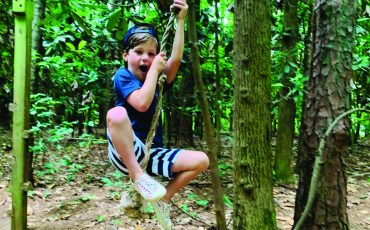A Dog For Your Family: It’s a Careful Decision
“Please can I have a dog? Please? I promise I’ll take care of it!”
Somewhere it must be written that every kid, at some point, will make this tearful plea. Parents, do not be so quick to answer or decide. There’s a lot to consider before saying “yes,” and a lot to reconsider if your gut instinct is “no.”
Worried that a puppy is too much work and might chew up anything within reach? There are hundreds of dogs six months old and up in your area that need loving homes. Think an older dog might come with too many unknowns or “issues”? Just a little time and education can indeed transform a shelter or rescue dog into your family’s greatest new joy.
But before addressing the “Can I have a dog?” plea, ask yourself some important questions.
First, are you “dog people”? Liking dogs is a good start, but it’s not nearly enough, says Debra Berger, program director of the Georgia Center for Humane Education. “Having a dog is a big commitment both time-wise and emotionally. I always say that sometimes you show more love and compassion for animals by not getting a pet if you don’t have the time to care for it properly.”
Take a hard look at your family’s lifestyle before bringing a dog into the home, says Inga Fricke, director of sheltering and pet care issues for the Humane Society of the United States (HSUS). “A dog isn’t right for all households. Evaluate your schedule. If both parents work and the kids rush home from school to three different soccer practices and the family doesn’t even have time to sit and eat dinner together, then maybe a dog wouldn’t fit well with that family.”
Would a dog complement or complicate our family’s life? Fricke says you need to know the answer to that question.
If “complement” is the answer, it’s time to do some research. It’s easy to fall in love with a pup’s cute face, but it’s more important to step back and consider the full package: personality, size, and the age of the dog.
“We know our dogs pretty well here, so based on our interview with potential adopters, we can really match people to the right dog,” says Laura Linneman of Atlanta Pet Rescue. “Sometimes people come in looking for a certain dog, and we send them home with a totally different one because, through the process, they might have realized their first instinct wasn’t actually what they wanted.” Like many other rescue groups, Atlanta Pet Rescue won’t adopt a dog to a family unless all members are present. It’s important to evaluate everyone’s interactions with the pup.
“Identify a dog that aligns with the activity level and behavior of your kids,” advises William Shaheen, president of the Atlanta Humane Society (a privately funded entity, not affiliated with the HSUS). “A family of rough-and-tumble youngsters should not adopt a shy or timid dog.” He adds that “it’s important for kids to understand that dogs are not play things.” Berger echoes that advice, reminding that many dogs end up in shelters to begin with because they aren’t treated well, especially by young kids.
Some dogs just don’t respond well when treated with too much aggression.
“Parents really have to teach their kids to respect and be kind to animals,” Berger notes.
Also, be willing to let go of some preconceived ideas. “There’s this myth that you have to start with a puppy so you’re not dealing with the dog’s baggage of whatever life it had before,” says Fricke. “But really there are advantages to adopting an older dog.”
She explains that personality doesn’t really solidify in a dog until they are at least six months old. Fricke adds, “Puppies don’t have the bladder control to last through an eight-hour work day, or sometimes even a four-hour soccer-and-lunch outing. It’s just easier to integrate older dogs into a family and schedule.”
Whether you decide a puppy or an older dog is right for you, don’t shy away from shelters and rescue organizations as a first place to look. “It’s a myth that shelters are full of misfit, reject biters,” Fricke says. “I always say that most dogs end up in shelters not because of behavior problems, but because of owner problems.” Berger agrees, adding that many shelter dogs can “have initial issues, but they are completely surmountable with a little education on what to do and how to make the transition work. There are a ton of books and great Web resources out there.”
A dog ultimately belongs to the adult in the house. “Kids growing up with dogs is often very rewarding,” says Shaheen. “However, in my experience it’s unrealistic to expect kids to truly take responsibility for the dog. Parents should adopt only when they are prepared to do at least 80 percent of the work, as they are ultimately responsible for the dog’s welfare.”
Fricke adds that many dogs are at shelters because the parent brings in the pup, often with crying kids in tow, and says: “They said they would take care of it and they didn’t, so here you go.” That’s quite stressful for the kids and the dog, but also it’s a bad message for kids. “It’s teaching them that having a pet is a disposable responsibility,” he says. “That this is a toy they can return, when really it’s a living, breathing creature.”
Fricke points out the pay-it-forward aspect of adopting a dog. “You’re modeling social responsibility. Let your kids know what shelters do, what function they serve and how animals end up there. Teach them the importance of spaying and neutering and of supporting shelters in their work. Let them realize they’re saving a life by adopting a pet from a shelter.” Berger agrees: “The joys of bringing a previously abandoned animal into your home are immeasurable.”
In addition to breed-specific rescue organizations, shelters are actually a great place to find purebreds – they account for one-quarter of all dogs there. And the other three-quarters? Fricke points out that the current trend is to spend a fortune on a mixed breed anyway. “People are paying upwards of $2,000 for what are called designer breeds, like doodles or puggles, when really these dogs are mutts. They are paying for a perceived trait, like the dog might be hypoallergenic, but really none of this is known.
Want a designer dog? Go to a shelter, make up a name for your mixed breed and parade it around.” Shelter dogs – it’s the next big thing!








